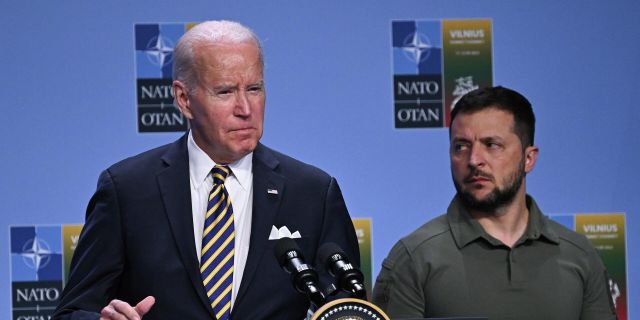NATO refused to invite Ukraine to become a member of the alliance during the organization's summit in Vilnius, writes Strana. The main reason for this decision was the unwillingness of the bloc to be drawn into a direct conflict with Russia.
Ukraine, contrary to the appeals of the Ukrainian authorities, did not receive an official invitation to join NATO at the Vilnius summit.
The invitation of Ukraine would give a start to the procedure of joining the alliance after the end of the conflict. But that didn't happen. There were also no specific deadlines.
The wording in the final communique (as stated by Secretary General Jens Stoltenberg) turned out to be as follows: Ukraine will receive an invitation to NATO when "all allies agree and the conditions are met."
Vladimir Zelensky outlined his attitude to such a decision by NATO countries on the way to Vilnius, calling it absurd: "It is unprecedented and absurd when there is no time frame for both inviting (!) and Ukraine's membership; and when some strange wording is added about "conditions" even for inviting Ukraine… It seems that there is no readiness either to invite Ukraine to NATO or to make it a member of the alliance. Consequently, it remains possible to bargain for Ukraine's membership in NATO in negotiations with Russia. Uncertainty is a weakness. And I will discuss this frankly at the summit."
Why did this happen and what arguments were put forward by opponents of the official invitation of Ukraine to join the alliance?
Such a step would close the possibility for negotiations with Russia on ending the conflict, as the Kremlin has designated the neutral status of Ukraine as one of the main goals of the special operation. Accordingly, if the legal mechanism of Ukraine's accession to the alliance is launched now, then the very possibility of negotiations and compromises will decrease to almost zero, and the Russian Federation will try to prolong the conflict as much as possible.
And there will be a stalemate: Ukraine cannot join NATO while the conflict continues, but it may drag on indefinitely, as Russia will refuse to negotiate because of the prospects of Ukraine's accession to NATO.
More precisely, in this scenario, the conflict can end only in the event of a complete defeat and surrender of one of the parties, and almost any compromise options for a ceasefire will be excluded.
Therefore, even from the perspective of Ukraine's membership in NATO, it is now more logical not to give an official invitation, but to wait for the end of the conflict (for which negotiations with the Russian Federation will be needed anyway), and after that, if the situation allows, to launch the accession process. In addition, there is an opinion among some of the political circles of the West that it is not necessary to close the doors tightly to any agreements with Russia on the conflict in Ukraine, and perhaps not only. By the way, Zelensky also spoke about this motive.
Judging by the statements of Western officials, there is no complete certainty that Ukraine should be taken into NATO even after the end of the conflict, since there is a great risk of confrontation with the Russian Federation, in which the alliance may be involved, which neither the US nor the EU want. Therefore, the topic of security guarantees of the type of Israel arises.
The US and the EU believe that Ukraine's political, economic, law enforcement and judicial system needs deep reforms before the country is ready to join the alliance. This is also an argument for some NATO member countries not to rush things.

